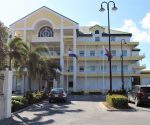Search at Central Bank was not unlawful, court rules
WILLEMSTAD – The Court in First Instance confirmed last week that the Common Court of Justice did not give permission for a search at the Central Bank in Willemstad on October 6. However, the court also ruled that the search was not unlawful because of this formality.
The anti-corruption unit – part of the Detective Collaboration Team (RST) and the Attorney General’s office – led by an investigative judge searched the main office of the Central Bank in October as part of the investigation into alleged tax evasion by the bank’s president, Dr. Emsley Tromp.
The search was necessary because the bank was not willing to provide requested information for legal reasons. This information was provided by the bank during the search and seized by the investigative judge. The anti-corruption unit specializes in combatting crime that aims to undermine legitimate society by committing acts such as (tax) fraud, corruption and money laundering.
The Central Bank had filed a complaint with the court about the search and said in a press statement issued yesterday that it disagrees with the court’s latter opinion.
When the Bank Charter was introduced in 2010 the legislator in Curacao erroneously did not use the final version.
“The bank charter has been legally established and the minor differences between the versions published in Curacao and St. Maarten have been acknowledged and corrected by the legislator in 2011. This issue was not brought up during the court hearing and an appeal against the interim-ruling of the court is not possible,” the Central Bank noted in its press release.
The bank repeats that it will abide by its duty to confidentiality, and that it will continue to offer its full cooperation with the investigation against its suspended President Emsley Tromp.
The bank notes that the Judge of Instruction and the Public Prosecutor’s Office both have pledged to respect confidentiality during their examination of the confiscated documents.























